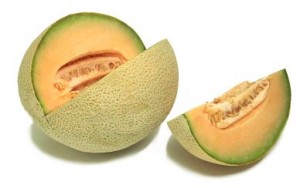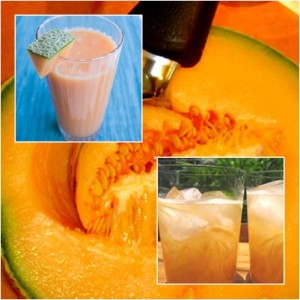The Heavenly Melon Juice
Melons
The plant family Cucurbitaceae is probably the most fortunate classification in plant taxonomy since it constitutes the healthiest and yummiest fruits and vegetables of all time. Melon or popularly known as cantaloupe is one the delicious fruits which belongs to this plant family along with watermelons, cucumbers, squash and pumpkins.
The term melon usually refers to the muskmelon varieties that include cantaloupes, Christmas melons, honey dew, casaba melons, Persian, Spanish, winter and Crenshaw melons. All muskmelons have either netted skins or smooth skins. They contain seeds and a hollow middle portion with some fibrous material. The most popular among the muskmelons is the cantaloupe. Cantaloupe is a round or oval shaped fruit, orange to yellow in color, with a distinctive netted skin. Its flesh is soft and juicy with a sweet and musky aroma that radiates through the melon when it is ripe. It grows on the ground on low trailing vines. Scientifically called Cucumis melo, cantaloupes are also known as rockmelons or Chinese melons in some parts of the world.
History of Cantaloupe
Cantaloupes are thought to be indigenous fruits in Ancient Persia, Africa or India and have been cultivated in these lands since ancient times proven by their historical documents. The true cantaloupe which is a different species of melon was first cultivated around 1700 AD in an Italian province called Cantalupa where its name was derived. Cantaloupes were introduced in the United States but didn’t instantly become a commercial crop until the very late 19th century. Today, several countries cultivate cantaloupe for commerce and these include United States, Turkey, Iran and other Central American Countries.
Cantaloupes Season!
Cantaloupes are becoming increasingly available throughout the year. You can purchase them in fruit sections in many supermarkets but they are of their best quality during the months of June to August. They are most abundant in late summer and early fall.
Fresh Melon Juice Recipe
This recipe is quite simple and quick but you’ll need to have a melon scraper or a coconut scraper to make this juice perfect.
Ingredients:
- 1 Large Cantaloupe Melon
- 8 cups water
- 1 cup sugar or to taste. Add more if needed.
- 3 teaspoon Vanilla flavor extract.
- Ice (cubes or crushed).
Instructions:
- Slice cantaloupe into halves
- Scrape the middle part (with seeds) of the cantaloupe with spoon into a bowl then set aside
- Using a melon scraper, scrape the flesh of Cantaloupe into another large bowl or a pitcher.
- Add water, sugar, vanilla, and ice.
- Transfer the reserved middle part of cantaloupe into a strainer and squeeze the juice into the cantaloupe mixture. This is the part of the melon where you get the concentrated sweetness and flavor.
- Serve immediately if you want to enjoy the bulk of melon flesh without getting it crushed, or blend the mixture in a regular blender for one minute or less if you want a smooth flawless melon juice.
Melon Juice Health Benefits
Exceptionally rich in Vitamin A and Beta Carotene
According to several nutritional studies, cantaloupes contain not only a good amount but an excellent concentration of vitamin A (5158.40 IU per 160 grams of cantaloupe). Its orange-colored flesh is rich in beta carotene that can be converted into vitamin A once inside our body. One cup of cantaloupe has few calories but it offers us more than a hundred percent (103.2%) of the daily recommended amount of vitamin A. Beta carotene and vitamin A are nutrients responsible for maintaining healthy eyesight. They also act as antioxidants in the body that fight against damage caused by oxygen free radicals.
Promotes Lung Health
A research conducted in Kansas State University studied the relationship between vitamin A and lung inflammation and emphysema. The research has found that a common carcinogen in cigarette smoke, specifically benzo pyrene induces vitamin A deficiency, and that a diet rich in vitamin A can help fight the effects of benzo pyrene including emphysema. It was discovered that vitamin A’s protective effects are probably the reason why some smokers do not develop emphysema despite smoking for several years. So if you’re exposed to second hand smoke or someone in your family smokes, make sure you include melons regularly in your diet. You may not be able to stop smokers from their bad habit of smoking but you will help reduce their and your risks of lung damage.
Keeps our Eyes Clear and Healthy
The high concentrations of vitamin A and beta carotene in cantaloupe also makes it a fruit that’s good for the eyes. These antioxidant nutrients are proven effective in lowering our risks of age-related macular degeneration. In fact, eating 3-4 servings of fruits daily may lower our risks of vision loss even as we grow old. Fruits rich in vitamin A and carotenoids such as melon are more protective than other fruits that contain smaller amounts of vitamin A.
Contains Other Nutrients
Aside from vitamin A, cantaloupes are also rich in vitamin C, vitamin B6, folate, niacin, potassium, and dietary fiber. The synergistic effect of B complex vitamins and fiber promotes optimum energy production by carbohydrate metabolism and regulation of blood sugar. Thus, drinking melon juice is not only refreshing and delicious, but also keeps you alive and kicking.
Best Melons For Melon Juice And How To Choose Them
When you’re new to juicing one melon looks just as …Melon Juice Side Effects – Can You Drink Too Much of It?
Many health-conscious people turn to melon juice for its many …Health Benefits of Melon Juice
Melon Juice is a delicious drink that is commonly made …Melon (Cantaloupe) Nutrition Facts
Melon (Cantaloupe) Nutrition Facts Betaine 0,1 mg Calcium 9 mg …